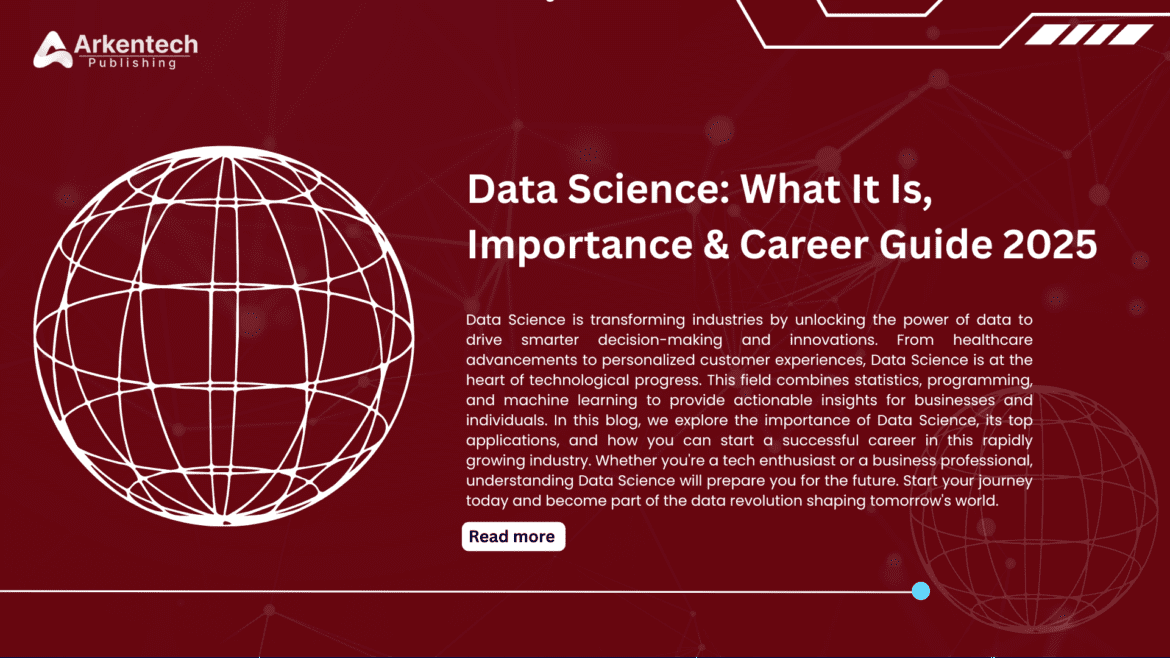What is data science?
Data science is the interdisciplinary field that uses scientific methods, algorithms and systems to remove knowledge and insight from structured and unnecessary data.
With simple words, data science helps businesses, authorities and individuals make better decisions using it .
In the core, it combines skills with statistics, informatics and domain knowledge to effectively treat and analyze the figures. Data uses devices such as Python, R, SQL and machine learning techniques to create professional predictions known as researchers and optimize operations.
The importance of data science in today’s world
In the digital age, data is generated at outstanding speed.
According to Forbes, more than 2.5 Quintalian Bytes data is made daily!
Without data science, this large amount of information will be meaningless.
The main reason why data science is important:
- Better decision -making: Companies use data insights to strategically and improve business results.
- Predictive analysis: Helps to predict future trends such as customer behavior or market movements.
- Privatization: Recommendation system for forces such as Netflix, Amazon and Spotify.
- Efficiency: Automation and adaptation protect time and costs through data -driven methods.
- If you are interested in how the industries are favorable for new technology, you can see our guide to Emerging Tech Career 2025.
Top application of data science
There are huge applications in data science industries. Some of the most important areas using data science include:
1. Health Services
• Prophet and diagnosis of the disease: Machine learning models predict diseases such as cancer and diabetes.
• Drug detection: Speeds The research process through data simulation.
2. Financing
• Detect fraud: Algorithm detects abnormal transactions and prevents fraud.
• Elgorithm trading: AI models predict stock market movements for better trade decisions.
3. Retail and e-commerce
• Recommended motor: Suggest products to users based on previous behavior.
• Inventory management: Profema population must reduce waste.
4. Education
• Personal learning: Analysis analyzes the student’s performance to create learning experiences.
You can find out more industry applications by reading the official page of IBM.
How to start a career in data science
Do you think of a career in data science? Here’s how to start:
Step by step road map:
1. Learn the basics
Understand data, probability and basic programming (Python, R).
2. Get experience on your hands
Work on real world projects and datasets. Kagal is a great platform to start.
3. Master Data Tool
Few skills in SQL, machine learning, data visualization (Tableau, Power BI).
4. Earned certificate
Certified through platforms such as Coursra, EDX or Google Data Analytics certificates.
5. Build a strong portfolio
Demonstrate your skills through a portfolio of projects on the Github or a personal website.
6. Network with professionals
Join LinkedIn groups, participate in webinars and collaborate on Open Source projects.
Tip: Check out our latest blog on top online career development certificates to stay ahead!
Conclusion
Data science is not just a discussion; This is the driving force behind the great innovations today. Whether you are a technical enthusiast or a business manager, understanding of this can open countless opportunities.
Start building your skills today and be part of the data revolution!
The future of data science is incredibly bright. With progress in artificial intelligence, machine learning and big data technologies, the demand for skilled computer professionals is expected to increase. Organizations of industries – from health services to finance – invest tongue in data capacities to gain competitive growth.
In addition, data science is a very versatile field that welcomes people with different backgrounds, including engineering, business, health care and even social sciences.
If you are emotional when it comes to problem solving, eager to patterns and is eager to create the influence of the real world, and this is the right career path for you.
Be obliged to continuously learn and embrace the developed landscape with data. Over the coming years, people who can effectively use the power of data will shape the future.

